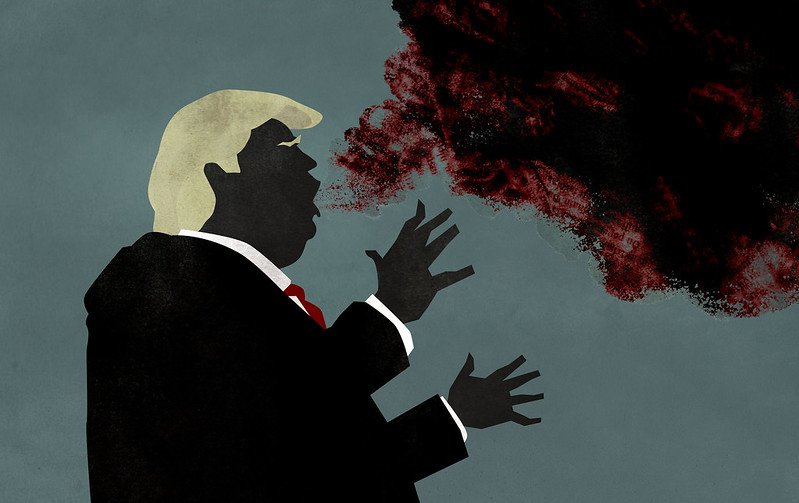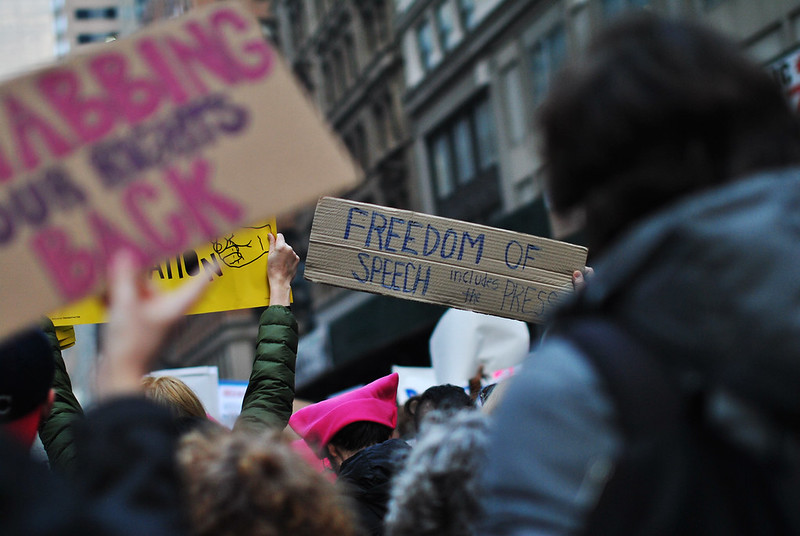Censorship vs Freedom of Speech

Lucy Aylmer discusses the compromise between censorship and freedom of speech in light of recent world events.
When Donald Trump was temporarily banned from Twitter for 12 hours amid the storming of the congress, Twitter stated the ban was on account of three offending tweets which were proclaimed to be a “severe violation of our civic integrity”. These tweets spoke warmly of those storming Capitol Hill by labelling them “patriots”. The President was also suspended from Facebook and Instagram after Facebook’s chief, Mark Zuckerberg Condemned the attacks on the US Capitol as a “violet insurrection against a democratically elected government” and that allowing Mr Trump to use their service posed risks that “are simply too great”. Many other social media outlets such as Snapchat, YouTube and Amazon Web Services have also taken decisive action against Trump’s ambivalence.
Amazon Web Services (AWS) removed Parler, a Twitter alternative that has a predominant conservative culture. Parler has since stated that AWS’s decission is “motivated by political animus” and that by removing Parler it has caused a serious breach of contract which requires 30-day notice period prior to to termination. Many have raised concerns over the undue power that the big four tech giants hold, and Parler’s claim can attest to this. Is it right that companies such as Amazon or Twitter can prescribe what people can and can’t say?
The oligopolistic power that these companies hold can create controversy amongst the public. Conservatives have argued that Google searches create bias against republicans and as such these oligopolies serve to “restrict conservative speech” and produce “filter bubbles”. According to Paula Bolyard, supervising editor of PJ Media, 96% of Google searches for Mr Trump were attributed to anti-Trump media outlets. Conservatives, including Mr Trump agrees that media bias disenfranchises republicans through limiting news choice and prioritising speech.
Is it right that companies such as Amazon or Twitter can prescribe what people can and can’t say?
Mr Trump is not the only politician to raise concerns over social media censorship. Angela Merkel, German chancellor promptly denounced Twitter’s decision to ban Mr Trump, on grounds of the “right to free speech”. Continuing, Ms Merkel stated that companies such as Facebook or Twitter should not have the power to restrict site content; instead it should be for regulators to enforce upon internet platforms. Other prominent political figures such as Alexa Navalny, Russian blogger and dissident, have been quick to accuse Twitter of acting on impulsive emotions and “personal political preferences”.
Indeed, many journalists believe that people have the right to freely express and share their social media platforms in order to initiate discussion. Tom Standage, deputy editor of The Economist states that social media is a two-way discursive environment where information is passed horizontally, rather than being delivered vertically from a central and verified source. Standage identifies that social media accommodates free expression. There are many contradictions that derail from banning Mr Trump from social media sites that have free speech at their core.

These arguments do not deter from the shocking events that unraveled in the U.S. in January. Five people died during the attack, including one police officer and a subsequent 60 Capitol police officers were injured. The events were completely devastating and unnecessary.
Twitter has defended its action and claimed Mr Trump had received multiple warnings. In May, Twitter attached a warning to an offensive tweet that Mr Trump posted in reference to the Minneapolis riots stating that “when the looting starts the shooting starts”. Further action has involved adding fact-checking links on posts which may be misleading. Many think that Mr Trump’s expressive tweets calling for action against the presidential election outcome provoked anger and incited violence, which led to the storming of congress. Whilst the Independent have cited Mr Trump a threat to “national security and public safety”.
Clearly words need to be accounted for, particularly when they concern the US President. According to the American Business Law Journal, boundaries between private speech and public speech are becoming increasingly blurred due to social media. Therefore, some argue social media users need to be held accountable for content published on personal social media accounts as this infringes upon the public domain. As seen in the US Capitol attacks, words can galvanise and inspire unwarranted sentiment that indoctrinates people to behave recklessly.
Social media sites do have a responsibility to protect their users. Proliferating fake news and extremists ideology are being deployed on social media as a way of spreading dangerous and misleading information. According to Forbes, social media users are more likely to believe fake news on social media sites. Therefore companies are coming under increasing pressure to take decisive action against user behaviour. Arguably, Mr Trump’s actions were the last straw in a series of controversies that bought @realDonaldTrump and social media head-to-head. Perhaps his punishment was far overdue.


